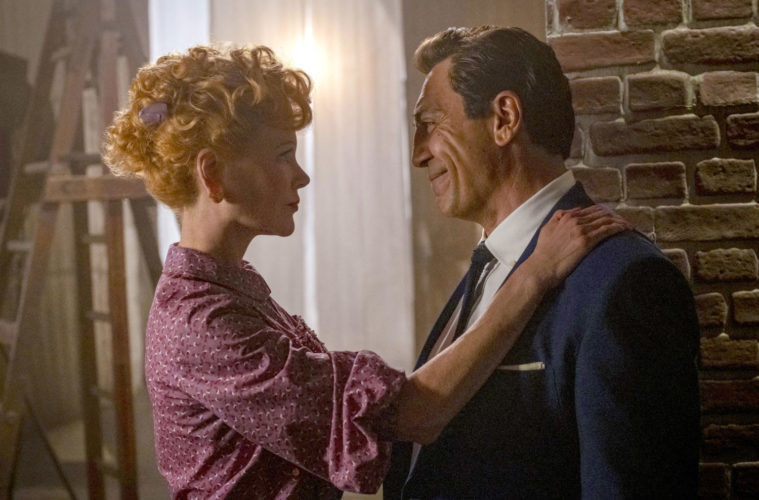More than anything else, Aaron Sorkin’s new masquerade-biopic, Being the Ricardos, is a master class in the diminishing returns of what we now call “Sorkinese.” Like the guile in a salesman’s spiel, you know it when you hear it. Not even David Mamet has such a distinctive dialogue voice. Everyone embroiled in a Sorkin script is the same kind of sniping wisenheimer, spitting tommy-gun aphorisms in studiously overlapping conversations that zing with sarcastic ricochets. Whether you are a White House official or Abbie Hoffmann or Steve Jobs or Mark Zuckerberg or, here, Lucille Ball, you’re a fast-thinking, tirelessly clever Sorkinian clone, dishing up a lather regardless of what’s being discussed.
Which may or may not be an issue, depending on our various saturation points — taken one dollop at a time, Sorkin’s bon mots can often light up like fireworks. How much is too much? Being the Ricardos is, in any case, an odd project for this topical impresario of snark, being a plunge into a particularly tumultuous week in the lives of Lucille Ball (Nicole Kidman) and Desi Arnaz (Javier Bardem), in their heyday as America’s most beloved sitcom wife-husband. It was “a scary week,” we’re told several times by actors (Linda Lavin, Ronny Cox) playing I Love Lucy production vets in their dotage, but we have to take their word for it, since Sorkin combines things that were not simultaneous. It’s 1953, and the conflated travails begin, as everyone attempts to execute a rather mundane episode of the show, with Ball being accused by radio gossipmonger Walter Winchell of having old Communist affiliations, at the height of the McCarthyite Red scare. Piled on top of that, as the Ball-Arnaz marriage is fraying, is Lucy’s pregnancy, which prompts the couple to strong-arm the queasy sponsors and network suits into incorporating the pregnancy and birth into the show.
“Scary” might be overselling things, but overselling is Sorkin’s forte, and his zippy, posh film stands in comically weird contrast to the dimestore austerity of the I Love Lucy show itself, like an opera about the writing of “Chopsticks.” The narrative stakes are nearly trivial, leaving us to contemplate the sideshows: the cranky booziness of second banana William Frawley (J.K. Simmons), the battle against mandated frumpiness waged by Mrs. Second Banana Vivian Vance (Nina Arianda), the behind-the-scenes frustrations of producer/writer Jess Oppenheimer (Tony Hale) and staff writer Madelyn Pugh (Alia Shawkat), and so on.
The business of putting together a live TV show is intriguing, but treated with Sorkin’s customary superficiality; the only deeper thought comes from Shawkat’s Pugh, who gets the now obligatory and largely anachronistic speech objecting to I Love Lucy’s pathetic depiction of submissive wifery and male domination.
The relentless backbeat of Sorkin’s dialogue is a distraction from nothing much altogether, but more so in other ways is Kidman, whose apparent adventures in cosmetic intervention have given her face a fiberglass veneer no amount of acting effort can adequately flex. (Apparently, prosthetic cheeks and such have been added to confuse things further.) “Most American women look like you, not me,” she tells Arianda’s Vance in one face-off, a line Sorkin might’ve skipped under the circumstances.
Kidman’s mask-like presence only emphasizes Sorkin’s distance from factual reality. The repeated correlation between Lucy’s Red Scare pickle and Desi’s own experience being routed from Cuba in 1933 is a stretch, even for Sorkin, as that coup d’etat was at the hands of a disgruntled military, not Communist revolutionaries. The plot’s twin dilemmas — bad publicity and network prudery — turn out to be inconsequential, and so is Sorkin’s movie. As you’d expect, Bardem is the saving grace here, his natural charm and gravity (sans prosthetics) energizing the film’s best scenes, including a rousingly convincing nightclub version of “Babalu” that overshadows the Arnaz original.
Read more of Michael Atkinson’s reviews here.
Advertising disclosure: We may receive compensation for some of the links in our stories. Thank you for supporting Irvine Weekly and our advertisers.

